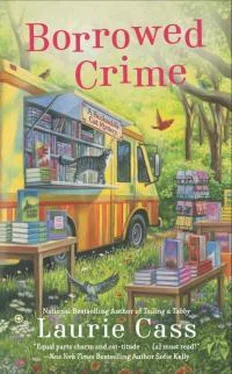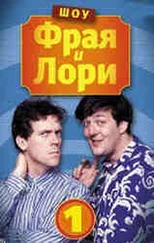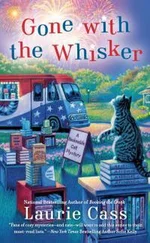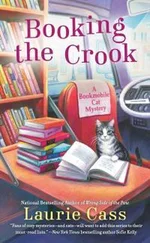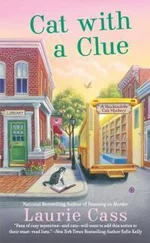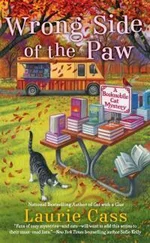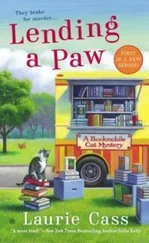“I know, right?” Denise nodded as if I’d agreed with her. “Who cares if she gave away her grandmother’s copy of Little Women by accident? I mean, am I asking for sympathy because my husband put my boxed set of A Song of Ice and Fire in the sale ? Can you believe he didn’t know it’s the same thing as A Game of Thrones ? I mean . . . What’s the matter?”
She asked this because I was braking hard. When we came to a stop, I turned on the four-way flashers, put the bookmobile into park, and turned to her.
“You gave away a boxed set of George Martin’s books?”
“Weren’t you listening? I didn’t give them away—Roger did.”
“To the book sale upstairs?” I asked. “The Friends’ sale?”
“You’d rather I take them to the Petoskey library? What’s wrong with you?”
“When we were on the bookmobile before,” I persisted, “you said you sometimes write in books. Did you write anything in those?”
“Oh, for crying out loud,” she huffed. “Is that what this is about—you’re worried that the Friends are selling defaced books? Well, gosh, Miss Librarian, I’m so sorry, but, yes, I did write in those books. Anyone who wanted to keep track of all those names would do the same thing. I didn’t know I was going to be graded on—”
“That note you sent to Allison Korthase.” Denise glared at my interruption, but right now I didn’t care about politeness. “That anonymous note. Did you write that by hand or did you print it out on the computer?”
“By hand,” she said sulkily. “So what?”
“The Wednesday before Roger died,” I said, remembering. Mitchell had handed me the key to the mystery without even knowing it. “Allison Korthase bought that boxed set. Did it have your name in it?”
Denise frowned, not understanding, but then her face went flat and white. “Yes. It did. Allison knows what my handwriting looks like,” she whispered. “She’s known for a month.”
The police needed to know, and they needed to know as soon as possible. “Do you have reception?” I pointed at Denise’s phone.
She glanced at the screen. “Not much.”
I turned off the flashers, checked for traffic, and pulled back onto the road. Spotty cell reception was one of the few annoying things about living Up North. I’d have to wait until we got back to Chilson to call the sheriff’s office.
The rain suddenly started pounding down full force times two. I flicked the windshield wipers to high and slowed to a safe speed. Denise wasn’t talking about the elephant on the bus, so I did. “I think Allison killed Roger. And I think she sliced your radiator hose.”
Denise stared through the wet windshield. “Roger was killed by a hunter. Allison didn’t kill him instead of me. It’s not my fault, and you’re being horrible to say so. You’re wrong—just plain wrong.”
I glanced at Eddie. He was sleeping. So much for him coming to my defense. That bond I’d mentioned to Aunt Frances hadn’t exactly stood the test of time. It hadn’t even lasted twenty-four hours.
“Allison is smart,” I said. “And she’s ambitious.”
“Now, that I can agree with.” Denise nodded. “You should have heard her, that day at the Friends, going on and on about how she was going to change things. So I asked her, right in front of everyone, ‘You’re going to do all that here in Chilson?’ She went a little pink and rambled on about how anyone can be a catalyst, but I bet she runs for a state office in a few years.”
And a congressional seat after that, I thought. But only if there’s nothing in her background to stain her. Only if she never writes that letter to the editor admitting that she plagiarized.
The rain slackened and I increased our speed the slightest bit. The sooner we got back, the sooner I could tell Detective Inwood about Allison.
Plus, the sooner I could get Denise’s voice out of my ears, the better. She had started talking louder to be heard over the rain, and even though the rain was slowing, her piercing voice was still penetrating my skin and going straight into my bones.
I shook my head, trying to get rid of the image, but it stuck, just like the last leaves of autumn were sticking to the road’s asphalt.
Denise rattled on about Allison’s shortcomings. “That husband of hers, he comes from money, but, then, so does she.” She managed to make it sound like a bad thing. “Her grandfather made a bundle down in Grand Rapids, I think it was, doing something with furniture.”
She made a gagging noise. “What could be so new about furniture that it makes someone enough money to live out at the point? There’s something seriously wrong with this world when people like that can— Minnie! What are you doing?”
What I was doing was pumping the brakes hard and fast, and there wasn’t anything else I could do to avoid what was surely going to happen.
In front of us, directly in front of us, far too close in front of us, was a huge washout. All the snowmelt and all the rain of the past few days had come down the hills and pounded into the side of the road. The runoff had found a weak spot, and the water had won. The gaping ravine felt acres wide and miles across, and if I didn’t stop the bookmobile in time . . .
“C’mon,” I told the bookmobile. “Stop, already. You can do it.”
Denise shrieked. “Minnie! Turn! You have to turn!”
But I couldn’t. That would be the absolute worst thing I could do. My truck-driver training had taught me that if I swerved while braking this hard, the bookmobile’s high center of gravity would tip us over, flopping us onto the side, or, worse, rolling us over completely. Books would fly off the shelves, each one a dangerous projectile, and we’d tumble over and over. Above all, what I couldn’t do was turn.
“Turn!” Denise shouted.
The tires slipped on the wet asphalt, slipped on the wet leaves, and we kept moving inexorably toward the pit.
“Minnie!” Denise was sobbing. “We’re going to die and it’s all your fault!”
Seriously? If I’d had even a fraction of a second to spare, I would have shot her one of Eddie’s Looks That Could Kill, but I didn’t have that much time. I had to steer us straight and I had to pump the brakes and I had to use all my will and strength and might to stop us. I had to stop us. I had to.
Denise’s shriek went up an octave and she covered her eyes.
Eddie started howling.
I kept braking. I kept steering.
Braking.
Steering.
Braking . . .
I was almost crying from the tension, my lower lip sharp with pain from biting, my chest tight from holding my breath, my hands so tight on the wheel that they’d never come off.
Slower and slower we went, but we were still coming closer to the edge of the gaping maw. How many feet? Too many.
Then the pavement was gone from view and we were still moving forward.
Denise’s shriek escalated to the upper range of an operatic soprano.
Eddie’s howls came close to matching hers.
I breathed a silent prayer.
The bookmobile’s front tires bumped forward over the edge of the washout . . . and then we stopped.
I turned off the engine immediately. The only things I could hear was rain spackling the windshield and the tick-tick-tick of the cooling motor.
“We’re . . . not dead?” Denise uncovered her eyes.
“Not even close.” But I wasn’t sure how stable we were. The washout looked wide, but the light was so poor that I couldn’t judge the depth. Ten feet? Twenty? I didn’t know and couldn’t guess. And if so much of the road had already washed away, how much more might go with it? “We need to get out, okay? Slow and easy.”
Читать дальше
